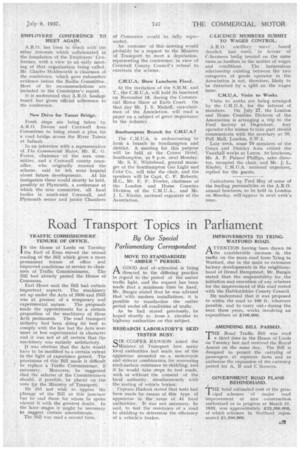Road Transport Topics in Parliament
Page 47

If you've noticed an error in this article please click here to report it so we can fix it.
By Our Special Parliamentary Correspondent
TRAFFIC COMMISSIONERS' TENURE OF .OFFICE.
IN the House of Lords on Tuesday the Earl of Erne moved the second 'reading of the Bill which gives a more permanent tenure of office and improved conditions of service to chairmen of Traffic Commissioners. The Bill had already passed the House of Commons.
Earl Howe said the Bill had certain important aspects. The machinery set up under the Acts of 1930 and 1033. was at present of a temporary and experimental nature. The proposals made the appointments for a certain proportion of the machinery of those Acts permanent. The road transport industry had been doing its best to comply with the law but the Acts were more or less experimental in character and it was not at all certain that the machinery was entirely satisfactory.
It was obvious that the Acts would have to be modified to a certain extent in the light of experience gained. The provisions of this Bill made it difficult to replace a Traffic Commissioner, if necessary. Moreover, he suggested that the salaries of the Commissioners should, if possible, be placed on the vote for the Ministry of Transport, He did not wish to -oppose the passage of the Bill at this j-unettize but he and those for whom he spoke viewed it with the greatest doubt. In the later stages it might be necessary to suggest certain amendments.
The Bill was read a second time. MOVE TO STANDARDIZE " AMBER " PERIOD.
AGOOD deal of :attention is being directed to the differing practice in regard to the period of the amber traffic light, and the request has been made that ,a minimum time be fixed. Mr. Burgin stated that he was advised that ''with'modern installations, it is possible to standardize the amber• period under all conditions of traffic.
As he had stated previously, he hoped shortly to issue a circular to highway authorities on this subject.
RESEARCH LABORATORY'S SKID TESTER BUSY.
QFR COOPER RAWSON asked the 1,-)Minister of Transport how many local authorities bad made use of the apparatus mounted on , a motorcycle and sidecar combination for measuring road-surface resistance to skidding; and' if he would take steps to _test roads, with or without the consent of the local authority, simultaimmisly with the testing of vehicle brakes.
Captain Hudson stated that tests had been made by means of this type of apparatus in the areas of 41 local authorities. It was not necessary, he said, to test the resistance of a road to skidding to determine the efficiency of a vehicle..s brakes. IMPROVEMENTS TO TRINGWATFORD ROAD.
ATTENTION having been drawn to the considerable increase in the traffic on the main road from Tring to Watford, due in the main to extensive factory developments in the neighbourhood of Hemel Hempstead, Mr. Burgin stated that the responsibility for the initiation and execution of any schemes for the improvement of this road rested with the Hertfordshire County Council.
He understood that it was proposed to widen the road to 100 ft. wherever possible, and to carry out,. during the next three years, works involving an expenditure of £100,000.
AMENDING BILL PASSED. .
THE Road Traffic Bill was read a third time in the House of Lords On Tuesday last and received the Royal Assent on the same day. The Bill is designed to permit the carrying of passengers at separate fares and to authorize the expansion of the currency period for A, B and C.' licences.
GOVERNMENT ROAD PLANS BEHINDHAND.
THE total estimated cost of the principal schemes of major road improvement or new .construction authorized or in progress at March 31, 1937, was approximately £23,300,000, of which schemes in Scotland retiresainted £1,500,000.




















































































